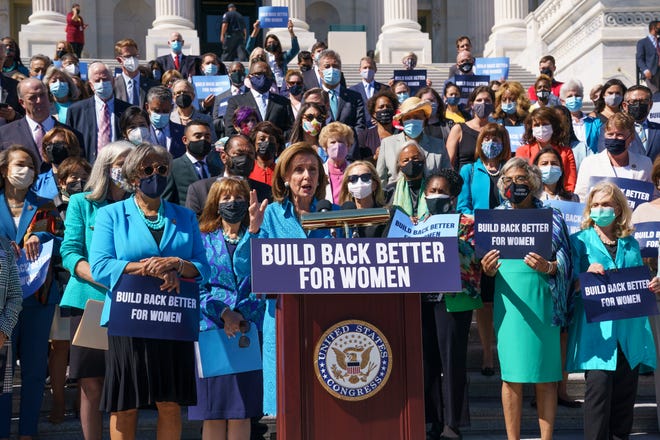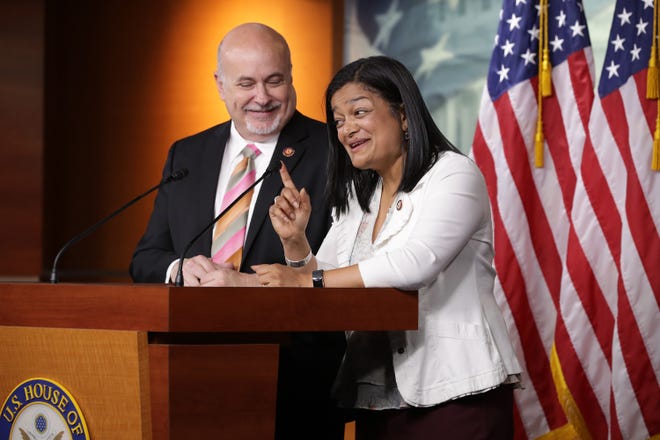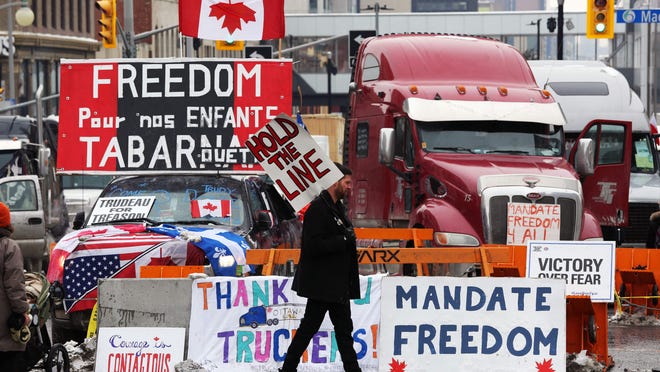
WASHINGTON – Senate Republicans blocked debate Monday on extending funding for the federal government and raising the debt limit, forcing Democratic leaders to scramble to avoid a government shutdown and default.
The Senate voted 48-50 to begin debate on the measure the House already passed, which wasn't enough to overcome a Republican filibuster. The bill would have extended government funding to Dec. 3 and suspended the debt limit until Dec. 16, 2022. The measure also would have provided $28.6 billion for disaster assistance and $6.3 billion for Afghan refugees.
But 60 votes were needed to overcome a Republican filibuster.
Republicans have insisted that Democrats deal with the debt limit on their own to avoid supporting the broader taxing and spending priorities of Democrats. But Democrats argue both parties should support raising the debt limit, as happened three times during the Trump administration, because a default could spark a worldwide economic crisis.
Elections in 2022:History shows why moderate Democrats may be hesitant about Biden's agenda as 2022 elections loom
“It’s an unhinged position to take,” said Senate Majority Leader Chuck Schumer, D-N.Y. “There is no scenario in God’s green earth where it should be worth risking millions of jobs, trillions in household wealth, people’s Social Security checks, veterans’ benefits and another recession just to score short-term, meaningless political points.”
But Senate Minority Leader Mitch McConnell, R-Ky., said Democrats should separate the government funding extension from the debt limit – and then raise the debt limit themselves.
“Democrats want to use this temporary pandemic as a Trojan horse for permanent socialism,” McConnell said. “Republicans aren’t rooting for a shutdown or debt limit breach.”
Democrats must now find another way to keep the government operating and the country borrowing. Without a funding extension, the federal government will shut down Friday. Treasury Secretary Janet Yellen projected the country will reach its limit on borrowing in mid-October.
The second-ranking Republican, Sen. John Thune of South Dakota, said his colleagues are trying to figure out where things head next.
“I get no sense that there’s any kind of a grand strategy right now,” Thune said. “A lot depends on what happens in the House. I keep hearing that the House is going to send us a short-term” funding extension.
Rep. Stephanie Murphy, D-Fla., who supports the infrastructure bill and voted against the $3.5 trillion package in the Ways and Means Committee, said much work remains to negotiate between the House, Senate and White House on the larger package.
“It's a real challenge to have all of those details, but we're all committed to trying to work as hard as we can to get there,” Murphy said. “But it's critically important that we pass the infrastructure bill because I think it will provide us the momentum that we need to get the reconciliation bill across the finish line.”

House starts debate on bipartisan infrastructure bill
The House began an hour of debate Monday on an infrastructure bill, but isn’t expected to vote until Thursday as lawmakers haggle over the rest of President Joe Biden’s agenda.
The $1.2 trillion infrastructure bill, which includes $550 billion in new funding, has already been approved by a bipartisan majority in the Senate.
A group of nine moderate Democrats negotiated for a vote by Monday in exchange for their support for a $3.5 trillion framework for Biden’s social welfare priorities. The deadline slipped to what moderates said would be “no later than Thursday,” when federal highway legislation expires.
“This bill is a huge win for the American people, and one we have proudly worked on for months with our House and Senate colleagues of both parties,” the group said Monday in a joint statement. “The American people have waited long enough for the jobs and investment this bill will deliver.”
The statement was from Democratic Reps. Carolyn Bourdeaux of Georgia, Ed Case of Hawaii, Jim Costa of California, Henry Cuellar of Texas, Jared Golden of Maine, Vicente Gonzelez of Texas, Josh Gottheimer of New Jersey, Kurt Schrader of Oregon and Filemon Vela of Texas.
But progressive Democrats in the House threatened to oppose the bill unless it were approved in tandem with a $3.5 trillion package. Rep. Pramila Jayapal, D-Wash., who heads the Progressive Caucus, said dozens of Democrats could oppose the infrastructure bill and possibly reject it.
“We have at least 50 people who are not going to vote for that bill,” Jayapal told CNN’s “State of Union” on Sunday. “This is the president's Democratic agenda. We will deliver on both of them.”
– Bart Jansen
McConnell, Schumer accuse each other of recklessness
Senate leaders clashed again Monday, each accusing the other side of recklessness ahead of a key vote over whether to extend government funding temporarily and raise the country’s debt limit.
Senate Majority Leader Chuck Schumer, D-N.Y., said it would be reckless and irresponsible if Republicans refused to help raise the amount the country can borrow, which is projected to be exhausted in mid-October. A measure to raise the debt limit was combined with legislation to extend government funding beyond Thursday, when it expires, to Dec. 3.
“If Republicans follow through with their plans to vote no, they will be on record deliberately sabotaging our country’s ability to pay the bills and likely cause the first ever default in American history,” Schumer said.
But Senate Minority Leader Mitch McConnell, R-Ky., said the challenges facing Democrats such as inflation, illegal immigration and the chaotic withdrawal from Afghanistan, were all self-inflicted. He said Republicans wouldn’t help raise the debt limit for President Joe Biden’s $3.5 trillion of domestic social welfare programs.
“As we speak, Democrats are behind closed doors assembling a multi-trillion-dollar reckless taxing and spending spree,” McConnell said. “There’s no chance Republicans will help lift Democrats’ credit limit so they can immediately steamroll through a socialist binge that will hurt families and help China.”
– Bart Jansen
What is the bipartisan infrastructure bill?
House Speaker Nancy Pelosi, D-Calif., said the House will vote Thursday on the bipartisan infrastructure bill that passed the Senate last month.
Should the Democratic-led House pass the bill Thursday, it would go to President Joe Biden to be signed into law.
But what is in the bill?
Roads, broadband and bridges:Here's what's in the infrastructure agreement
The bill would direct billions to modernize roads, bridges and transit systems while expanding high-speed internet systems and the nation's network of electric vehicle charging stations.
The legislation calls for $550 billion in spending. Among the major investments in the bipartisan package are $110 billion for roads and bridges, $39 billion for public transit and $66 billion for railways. It contains $55 billion for water and wastewater infrastructure, as well as billions for airports, seaports, broadband internet and electric vehicle charging stations.
– Savannah Behrmann, Ledyard King and Bart Jansen
Joe Biden optimistic Congress can avoid shutdown, pass his agenda
President Joe Biden said Monday he is optimistic Congress will extend government funding to avoid a shutdown, raise the debt limit and approve his $3.5 trillion package of social welfare priorities, but it may not all be completed this week.
“I’m a born optimist,” Biden said. “I think things are going to go well. I think we’re going to get it done.”
Biden said after getting a booster vaccination against COVID-19 that he had meetings on his legislation priorities scheduled Monday night, Tuesday “and for the next little bit.”
What's happening this week:Congress enters 'eventful week': Infrastructure vote, government shutdown possible
Government funding runs out Thursday. The country’s ability to borrow is estimated to be exhausted in mid-October. The Senate will vote Monday on a measure to extend funding to Dec. 3 and suspend the debt limit to December 2022, but that vote is expected to fail.
In addition, the House is considering a $1.2 trillion infrastructure bill and the $3.5 trillion package of domestic priorities. Infrastructure might not pass without the larger package, but some moderate Democrats are reluctant to approve both measures.
“It may not be by the end of the week,” Biden said. “I hope it’s by the end of the week.”
Asked what’s at stake, Biden said: “Victory is what’s at stake.”
– Bart Jansen
House to open debate on infrastructure bill
The House is scheduled to open debate Monday on a bipartisan infrastructure bill, setting up a high-stakes showdown over how much spending Congress will approve this year.
The Senate has already approved the $1.2 trillion infrastructure bill, which includes $550 billion in new spending. So if the House approves it, the bill would go to Biden for his signature.
A group of moderate House Democrats had negotiated for a vote by Monday, arguing that they should claim victory on infrastructure before the more contentious package of $3.5 trillion of social programs is resolved.
Liz Cheney:Liz Cheney tells '60 Minutes' that 'I was wrong' to oppose gay marriage in past
House Speaker Nancy Pelosi, D-Calif., announced the infrastructure vote is slipping to Thursday, when the federal highway program expires.
One of the leaders of the moderate faction, Rep. Josh Gottheimer, D-N.J., insisted Friday that the infrastructure bill will be approved.
But Rep. Pramila Jayapal, D-Wash., said dozens of members of the Progressive Caucus will oppose the bill on its own and could reject it unless the $3.5 trillion is approved, too.
– Bart Jansen

Pelosi pitches Biden's priorities
Pelosi scheduled a Democratic Caucus meeting Monday at 5:30 p.m. EST for lawmakers to discuss their priorities. Democrats may still be meeting when they learn whether the Senate has gridlocked over government funding and the debt limit.
Besides the infrastructure bill, general government funding and the debt limit, Pelosi wants to approve the $3.5 trillion package of Biden’s priorities such as paid family and medical leave, universal pre-kindergarten and community college, and an expansion of Medicare. Biden’s slogan for approving those priorities is called “Build Back Better.”
But Republicans are unified in opposition to the package, leaving Democrats to approve it on their own. Several Democrats in each chamber have questioned the taxing and spending in the package, threatening its approval.
House and Senate leaders have been conferring with Biden on what should be included in the final package, so lawmakers can vote once on legislation that can win approval in both chambers.
The House Budget Committee assembled an initial version of the package Saturday from 13 committees. The House Rules Committee, which sets rules for how legislation is debated, could begin tweaking the legislation Tuesday for eventual floor debate.
“We have to find our common ground, respectful of each other's views,” Pelosi said Sunday on ABC’s “This Week with George Stephanopoulos.” “Overwhelmingly, the entirety of our caucus, except for a few whose judgment I respect, support the vision of Joe Biden. And we will pass – make progress on it this week.”
– Bart Jansen

Source link








